Why Prisoners Deserve the Right to Vote
VerifiedAdded on 2022/04/14
|6
|1563
|35
AI Summary
The Supreme Court and Congress declared that the constitutional rights of many convicted offenders are protected. As a consequence of a law approved by the United States Congress in 2000, people are allowed to practice their religion without interference(Petersilia, 2000). Offenders should be able to exercise the most basic of their civic rights, the Right to Vote, while their incarceration.
Contribute Materials
Your contribution can guide someone’s learning journey. Share your
documents today.
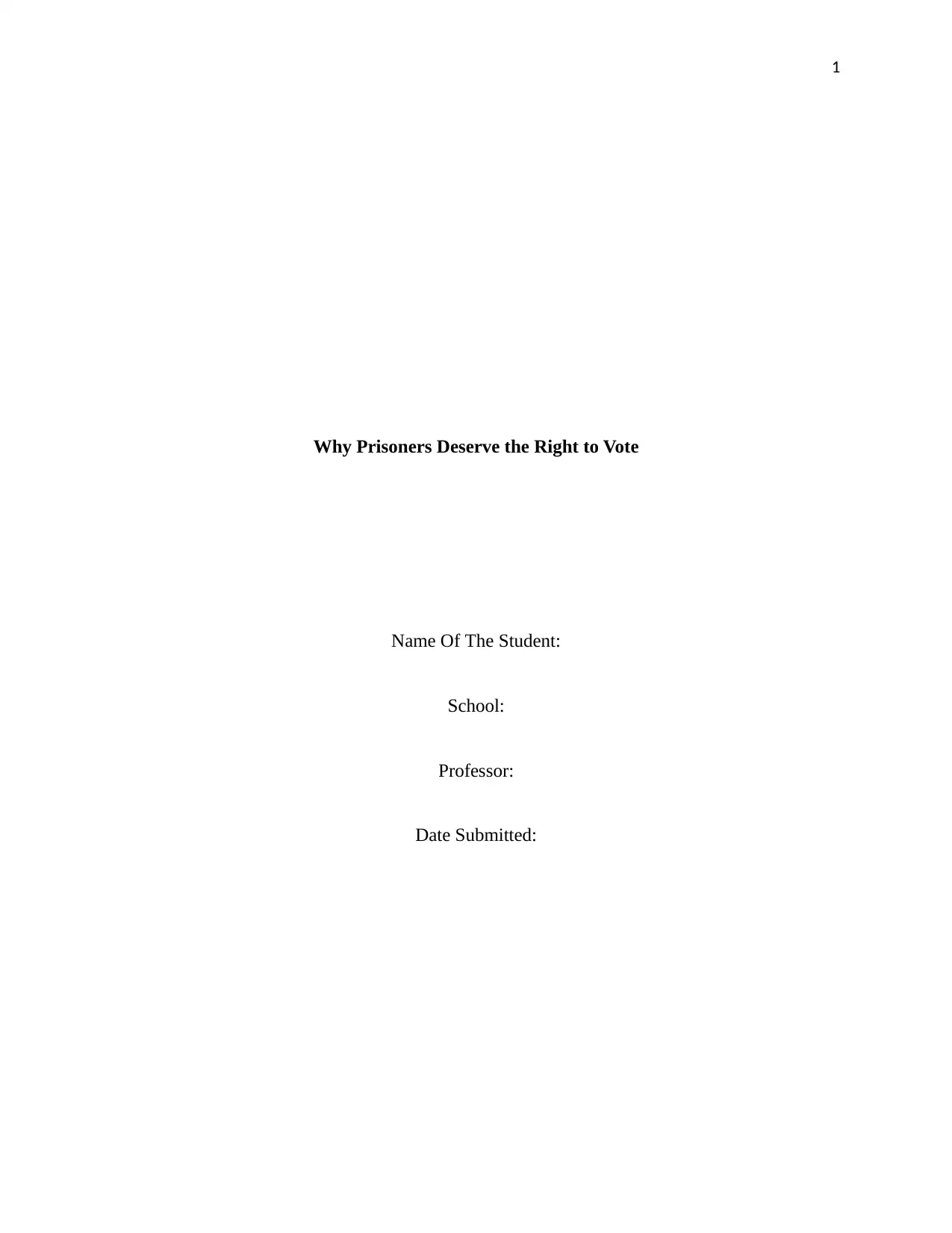
1
Why Prisoners Deserve the Right to Vote
Name Of The Student:
School:
Professor:
Date Submitted:
Why Prisoners Deserve the Right to Vote
Name Of The Student:
School:
Professor:
Date Submitted:
Secure Best Marks with AI Grader
Need help grading? Try our AI Grader for instant feedback on your assignments.
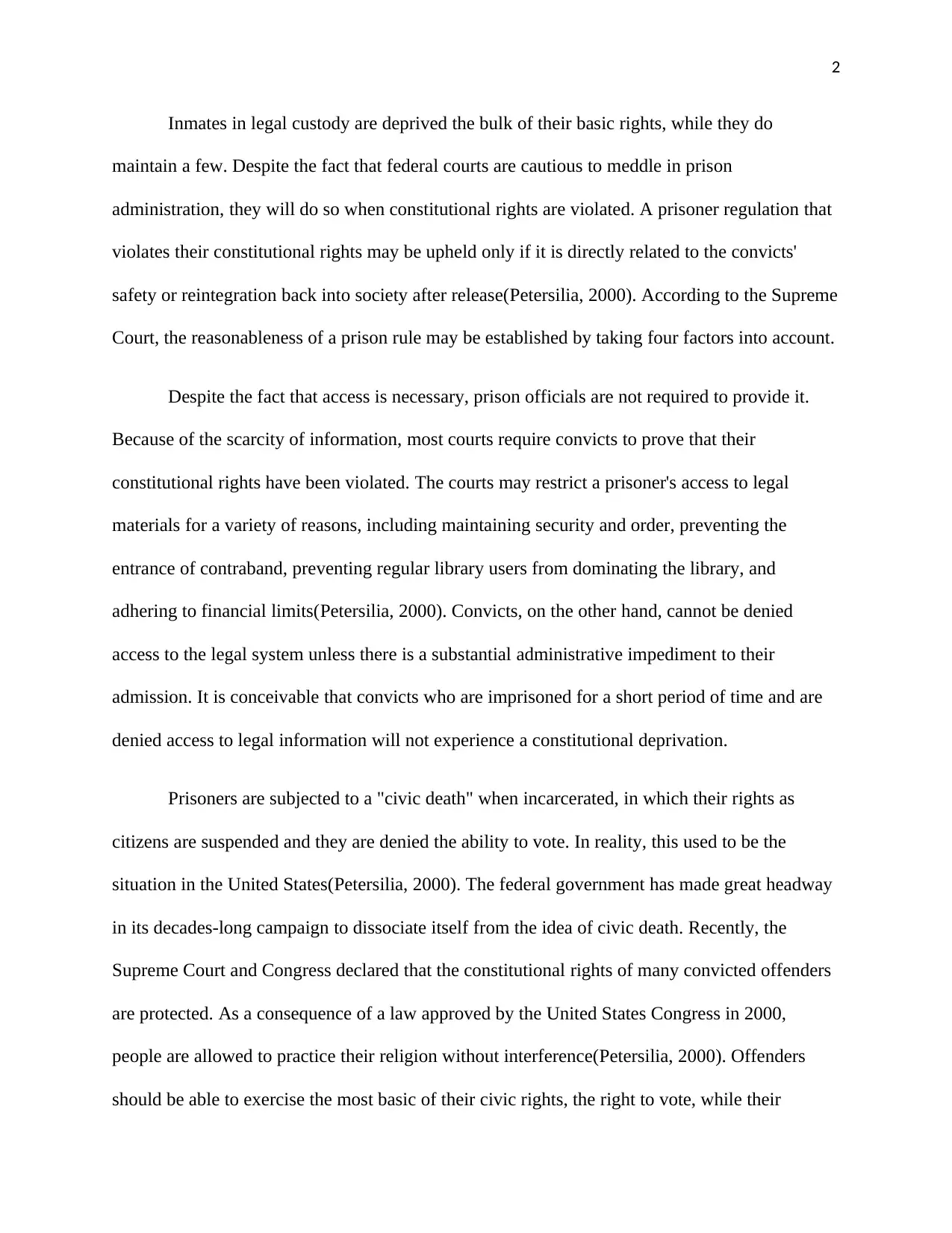
2
Inmates in legal custody are deprived the bulk of their basic rights, while they do
maintain a few. Despite the fact that federal courts are cautious to meddle in prison
administration, they will do so when constitutional rights are violated. A prisoner regulation that
violates their constitutional rights may be upheld only if it is directly related to the convicts'
safety or reintegration back into society after release(Petersilia, 2000). According to the Supreme
Court, the reasonableness of a prison rule may be established by taking four factors into account.
Despite the fact that access is necessary, prison officials are not required to provide it.
Because of the scarcity of information, most courts require convicts to prove that their
constitutional rights have been violated. The courts may restrict a prisoner's access to legal
materials for a variety of reasons, including maintaining security and order, preventing the
entrance of contraband, preventing regular library users from dominating the library, and
adhering to financial limits(Petersilia, 2000). Convicts, on the other hand, cannot be denied
access to the legal system unless there is a substantial administrative impediment to their
admission. It is conceivable that convicts who are imprisoned for a short period of time and are
denied access to legal information will not experience a constitutional deprivation.
Prisoners are subjected to a "civic death" when incarcerated, in which their rights as
citizens are suspended and they are denied the ability to vote. In reality, this used to be the
situation in the United States(Petersilia, 2000). The federal government has made great headway
in its decades-long campaign to dissociate itself from the idea of civic death. Recently, the
Supreme Court and Congress declared that the constitutional rights of many convicted offenders
are protected. As a consequence of a law approved by the United States Congress in 2000,
people are allowed to practice their religion without interference(Petersilia, 2000). Offenders
should be able to exercise the most basic of their civic rights, the right to vote, while their
Inmates in legal custody are deprived the bulk of their basic rights, while they do
maintain a few. Despite the fact that federal courts are cautious to meddle in prison
administration, they will do so when constitutional rights are violated. A prisoner regulation that
violates their constitutional rights may be upheld only if it is directly related to the convicts'
safety or reintegration back into society after release(Petersilia, 2000). According to the Supreme
Court, the reasonableness of a prison rule may be established by taking four factors into account.
Despite the fact that access is necessary, prison officials are not required to provide it.
Because of the scarcity of information, most courts require convicts to prove that their
constitutional rights have been violated. The courts may restrict a prisoner's access to legal
materials for a variety of reasons, including maintaining security and order, preventing the
entrance of contraband, preventing regular library users from dominating the library, and
adhering to financial limits(Petersilia, 2000). Convicts, on the other hand, cannot be denied
access to the legal system unless there is a substantial administrative impediment to their
admission. It is conceivable that convicts who are imprisoned for a short period of time and are
denied access to legal information will not experience a constitutional deprivation.
Prisoners are subjected to a "civic death" when incarcerated, in which their rights as
citizens are suspended and they are denied the ability to vote. In reality, this used to be the
situation in the United States(Petersilia, 2000). The federal government has made great headway
in its decades-long campaign to dissociate itself from the idea of civic death. Recently, the
Supreme Court and Congress declared that the constitutional rights of many convicted offenders
are protected. As a consequence of a law approved by the United States Congress in 2000,
people are allowed to practice their religion without interference(Petersilia, 2000). Offenders
should be able to exercise the most basic of their civic rights, the right to vote, while their
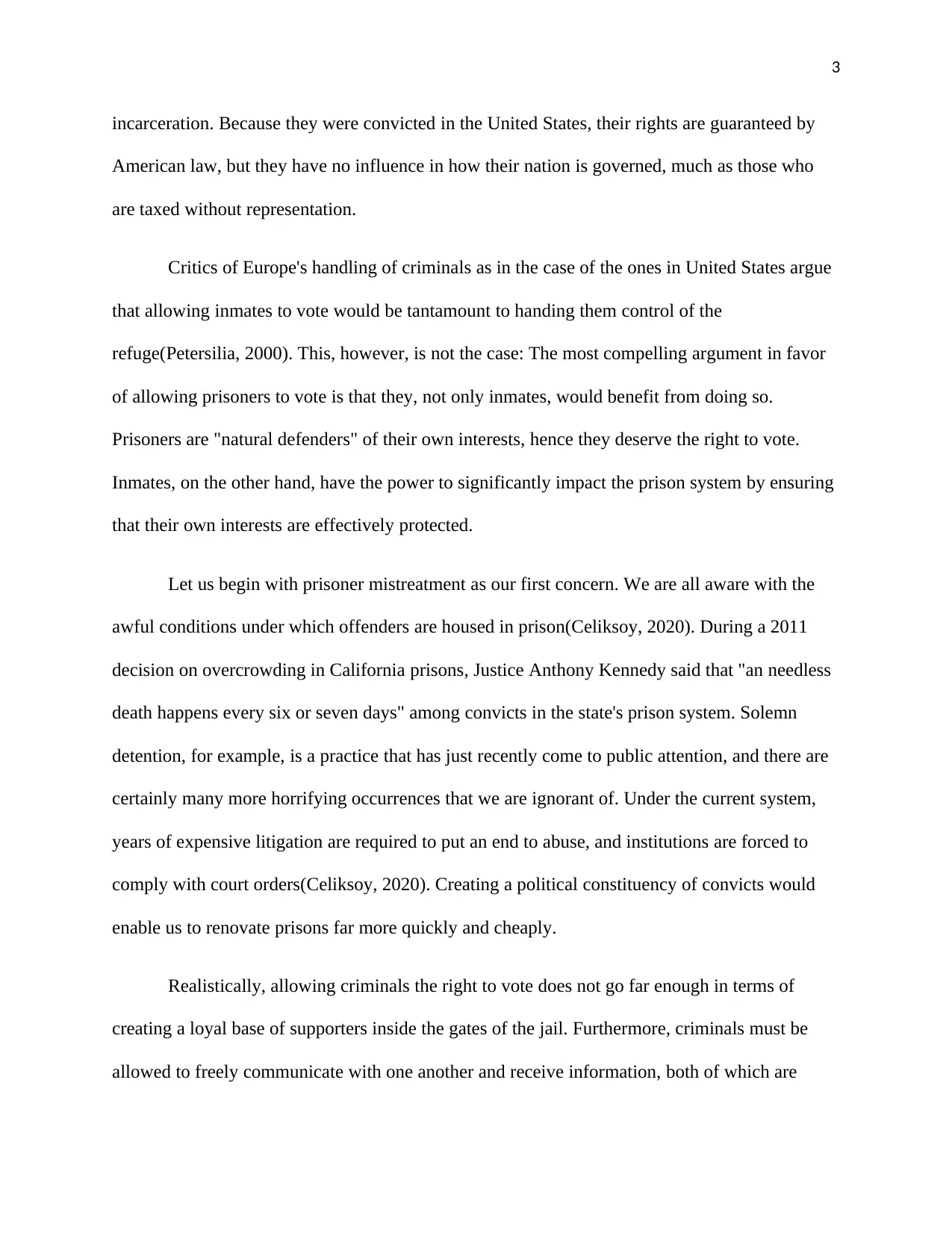
3
incarceration. Because they were convicted in the United States, their rights are guaranteed by
American law, but they have no influence in how their nation is governed, much as those who
are taxed without representation.
Critics of Europe's handling of criminals as in the case of the ones in United States argue
that allowing inmates to vote would be tantamount to handing them control of the
refuge(Petersilia, 2000). This, however, is not the case: The most compelling argument in favor
of allowing prisoners to vote is that they, not only inmates, would benefit from doing so.
Prisoners are "natural defenders" of their own interests, hence they deserve the right to vote.
Inmates, on the other hand, have the power to significantly impact the prison system by ensuring
that their own interests are effectively protected.
Let us begin with prisoner mistreatment as our first concern. We are all aware with the
awful conditions under which offenders are housed in prison(Celiksoy, 2020). During a 2011
decision on overcrowding in California prisons, Justice Anthony Kennedy said that "an needless
death happens every six or seven days" among convicts in the state's prison system. Solemn
detention, for example, is a practice that has just recently come to public attention, and there are
certainly many more horrifying occurrences that we are ignorant of. Under the current system,
years of expensive litigation are required to put an end to abuse, and institutions are forced to
comply with court orders(Celiksoy, 2020). Creating a political constituency of convicts would
enable us to renovate prisons far more quickly and cheaply.
Realistically, allowing criminals the right to vote does not go far enough in terms of
creating a loyal base of supporters inside the gates of the jail. Furthermore, criminals must be
allowed to freely communicate with one another and receive information, both of which are
incarceration. Because they were convicted in the United States, their rights are guaranteed by
American law, but they have no influence in how their nation is governed, much as those who
are taxed without representation.
Critics of Europe's handling of criminals as in the case of the ones in United States argue
that allowing inmates to vote would be tantamount to handing them control of the
refuge(Petersilia, 2000). This, however, is not the case: The most compelling argument in favor
of allowing prisoners to vote is that they, not only inmates, would benefit from doing so.
Prisoners are "natural defenders" of their own interests, hence they deserve the right to vote.
Inmates, on the other hand, have the power to significantly impact the prison system by ensuring
that their own interests are effectively protected.
Let us begin with prisoner mistreatment as our first concern. We are all aware with the
awful conditions under which offenders are housed in prison(Celiksoy, 2020). During a 2011
decision on overcrowding in California prisons, Justice Anthony Kennedy said that "an needless
death happens every six or seven days" among convicts in the state's prison system. Solemn
detention, for example, is a practice that has just recently come to public attention, and there are
certainly many more horrifying occurrences that we are ignorant of. Under the current system,
years of expensive litigation are required to put an end to abuse, and institutions are forced to
comply with court orders(Celiksoy, 2020). Creating a political constituency of convicts would
enable us to renovate prisons far more quickly and cheaply.
Realistically, allowing criminals the right to vote does not go far enough in terms of
creating a loyal base of supporters inside the gates of the jail. Furthermore, criminals must be
allowed to freely communicate with one another and receive information, both of which are
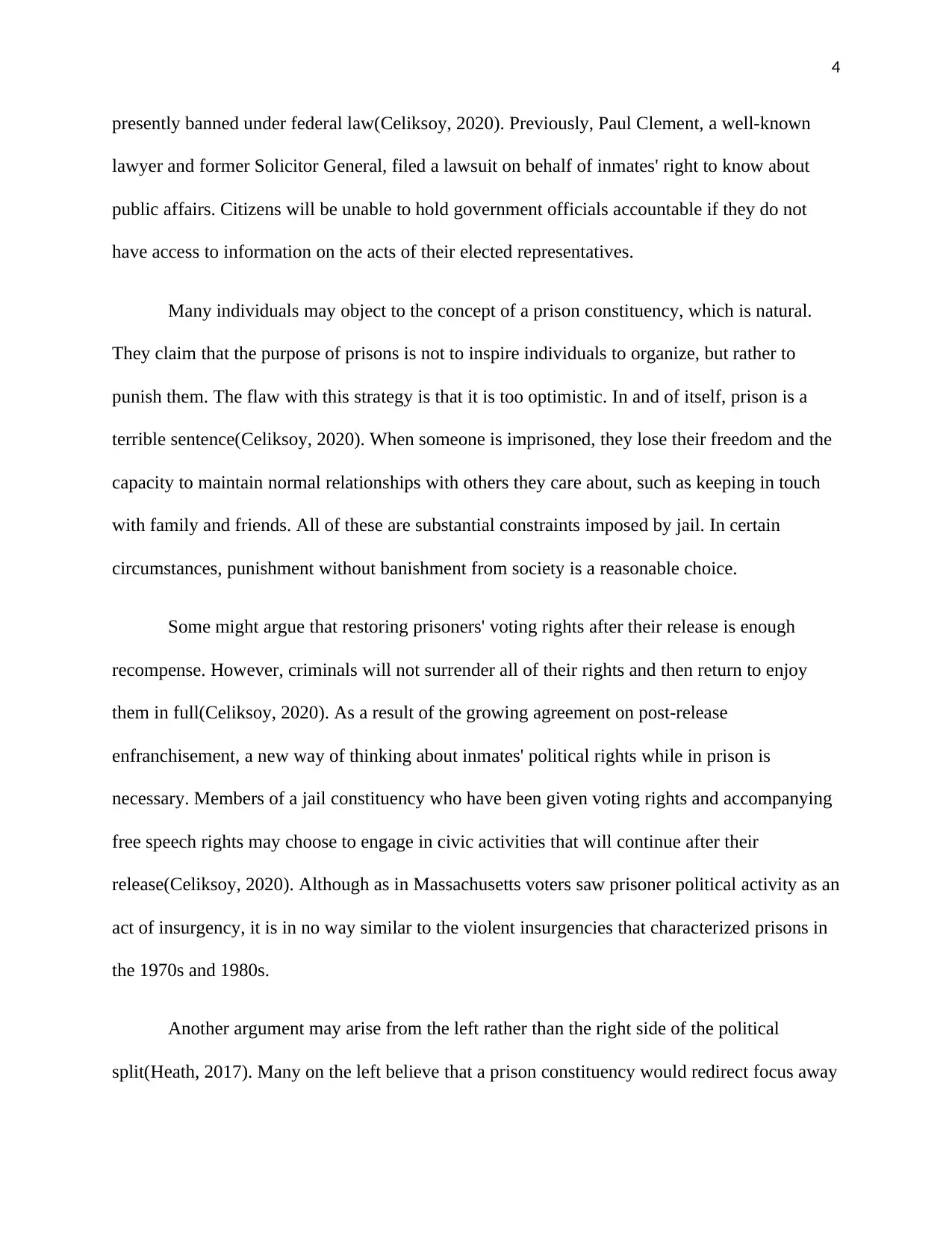
4
presently banned under federal law(Celiksoy, 2020). Previously, Paul Clement, a well-known
lawyer and former Solicitor General, filed a lawsuit on behalf of inmates' right to know about
public affairs. Citizens will be unable to hold government officials accountable if they do not
have access to information on the acts of their elected representatives.
Many individuals may object to the concept of a prison constituency, which is natural.
They claim that the purpose of prisons is not to inspire individuals to organize, but rather to
punish them. The flaw with this strategy is that it is too optimistic. In and of itself, prison is a
terrible sentence(Celiksoy, 2020). When someone is imprisoned, they lose their freedom and the
capacity to maintain normal relationships with others they care about, such as keeping in touch
with family and friends. All of these are substantial constraints imposed by jail. In certain
circumstances, punishment without banishment from society is a reasonable choice.
Some might argue that restoring prisoners' voting rights after their release is enough
recompense. However, criminals will not surrender all of their rights and then return to enjoy
them in full(Celiksoy, 2020). As a result of the growing agreement on post-release
enfranchisement, a new way of thinking about inmates' political rights while in prison is
necessary. Members of a jail constituency who have been given voting rights and accompanying
free speech rights may choose to engage in civic activities that will continue after their
release(Celiksoy, 2020). Although as in Massachusetts voters saw prisoner political activity as an
act of insurgency, it is in no way similar to the violent insurgencies that characterized prisons in
the 1970s and 1980s.
Another argument may arise from the left rather than the right side of the political
split(Heath, 2017). Many on the left believe that a prison constituency would redirect focus away
presently banned under federal law(Celiksoy, 2020). Previously, Paul Clement, a well-known
lawyer and former Solicitor General, filed a lawsuit on behalf of inmates' right to know about
public affairs. Citizens will be unable to hold government officials accountable if they do not
have access to information on the acts of their elected representatives.
Many individuals may object to the concept of a prison constituency, which is natural.
They claim that the purpose of prisons is not to inspire individuals to organize, but rather to
punish them. The flaw with this strategy is that it is too optimistic. In and of itself, prison is a
terrible sentence(Celiksoy, 2020). When someone is imprisoned, they lose their freedom and the
capacity to maintain normal relationships with others they care about, such as keeping in touch
with family and friends. All of these are substantial constraints imposed by jail. In certain
circumstances, punishment without banishment from society is a reasonable choice.
Some might argue that restoring prisoners' voting rights after their release is enough
recompense. However, criminals will not surrender all of their rights and then return to enjoy
them in full(Celiksoy, 2020). As a result of the growing agreement on post-release
enfranchisement, a new way of thinking about inmates' political rights while in prison is
necessary. Members of a jail constituency who have been given voting rights and accompanying
free speech rights may choose to engage in civic activities that will continue after their
release(Celiksoy, 2020). Although as in Massachusetts voters saw prisoner political activity as an
act of insurgency, it is in no way similar to the violent insurgencies that characterized prisons in
the 1970s and 1980s.
Another argument may arise from the left rather than the right side of the political
split(Heath, 2017). Many on the left believe that a prison constituency would redirect focus away
Secure Best Marks with AI Grader
Need help grading? Try our AI Grader for instant feedback on your assignments.
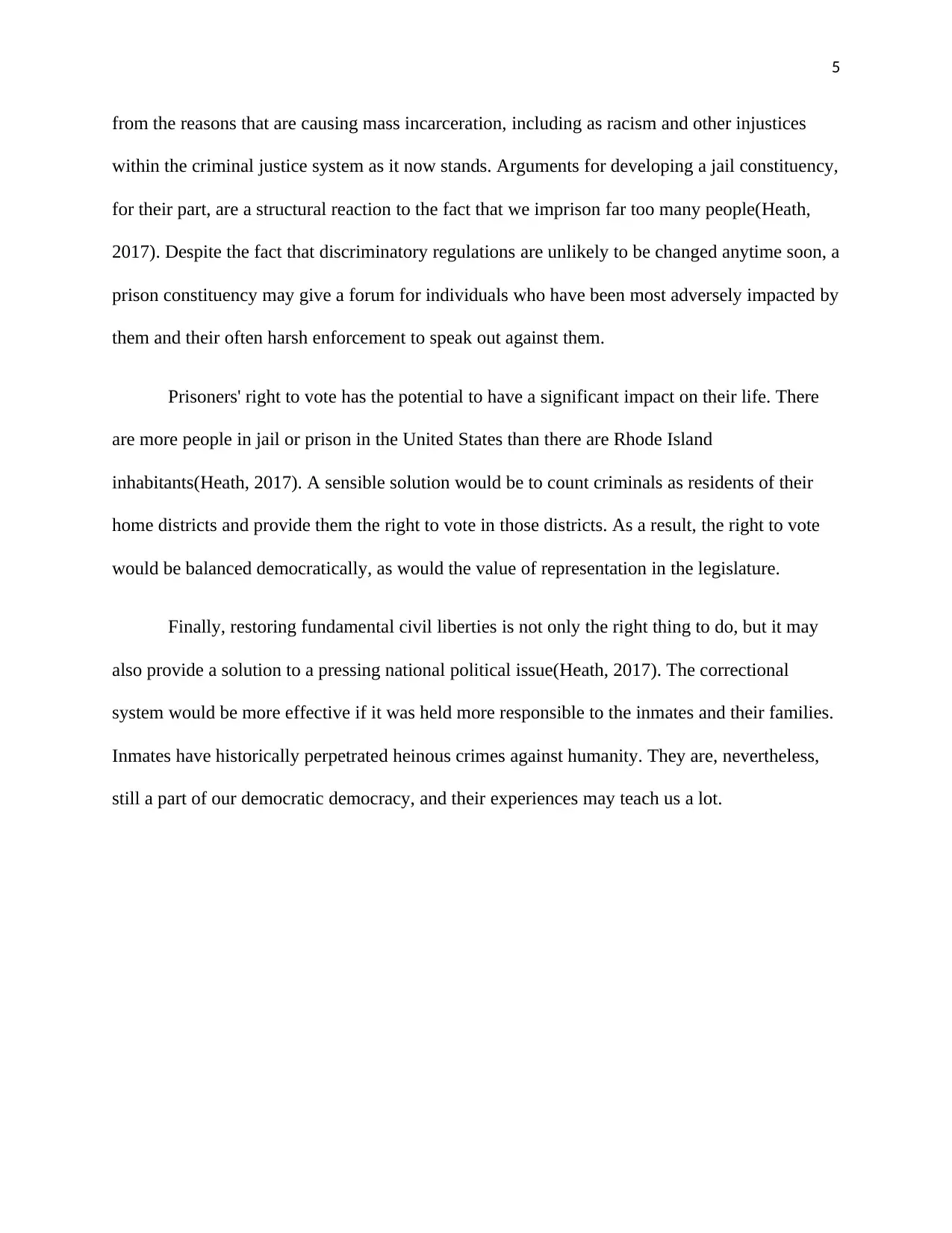
5
from the reasons that are causing mass incarceration, including as racism and other injustices
within the criminal justice system as it now stands. Arguments for developing a jail constituency,
for their part, are a structural reaction to the fact that we imprison far too many people(Heath,
2017). Despite the fact that discriminatory regulations are unlikely to be changed anytime soon, a
prison constituency may give a forum for individuals who have been most adversely impacted by
them and their often harsh enforcement to speak out against them.
Prisoners' right to vote has the potential to have a significant impact on their life. There
are more people in jail or prison in the United States than there are Rhode Island
inhabitants(Heath, 2017). A sensible solution would be to count criminals as residents of their
home districts and provide them the right to vote in those districts. As a result, the right to vote
would be balanced democratically, as would the value of representation in the legislature.
Finally, restoring fundamental civil liberties is not only the right thing to do, but it may
also provide a solution to a pressing national political issue(Heath, 2017). The correctional
system would be more effective if it was held more responsible to the inmates and their families.
Inmates have historically perpetrated heinous crimes against humanity. They are, nevertheless,
still a part of our democratic democracy, and their experiences may teach us a lot.
from the reasons that are causing mass incarceration, including as racism and other injustices
within the criminal justice system as it now stands. Arguments for developing a jail constituency,
for their part, are a structural reaction to the fact that we imprison far too many people(Heath,
2017). Despite the fact that discriminatory regulations are unlikely to be changed anytime soon, a
prison constituency may give a forum for individuals who have been most adversely impacted by
them and their often harsh enforcement to speak out against them.
Prisoners' right to vote has the potential to have a significant impact on their life. There
are more people in jail or prison in the United States than there are Rhode Island
inhabitants(Heath, 2017). A sensible solution would be to count criminals as residents of their
home districts and provide them the right to vote in those districts. As a result, the right to vote
would be balanced democratically, as would the value of representation in the legislature.
Finally, restoring fundamental civil liberties is not only the right thing to do, but it may
also provide a solution to a pressing national political issue(Heath, 2017). The correctional
system would be more effective if it was held more responsible to the inmates and their families.
Inmates have historically perpetrated heinous crimes against humanity. They are, nevertheless,
still a part of our democratic democracy, and their experiences may teach us a lot.
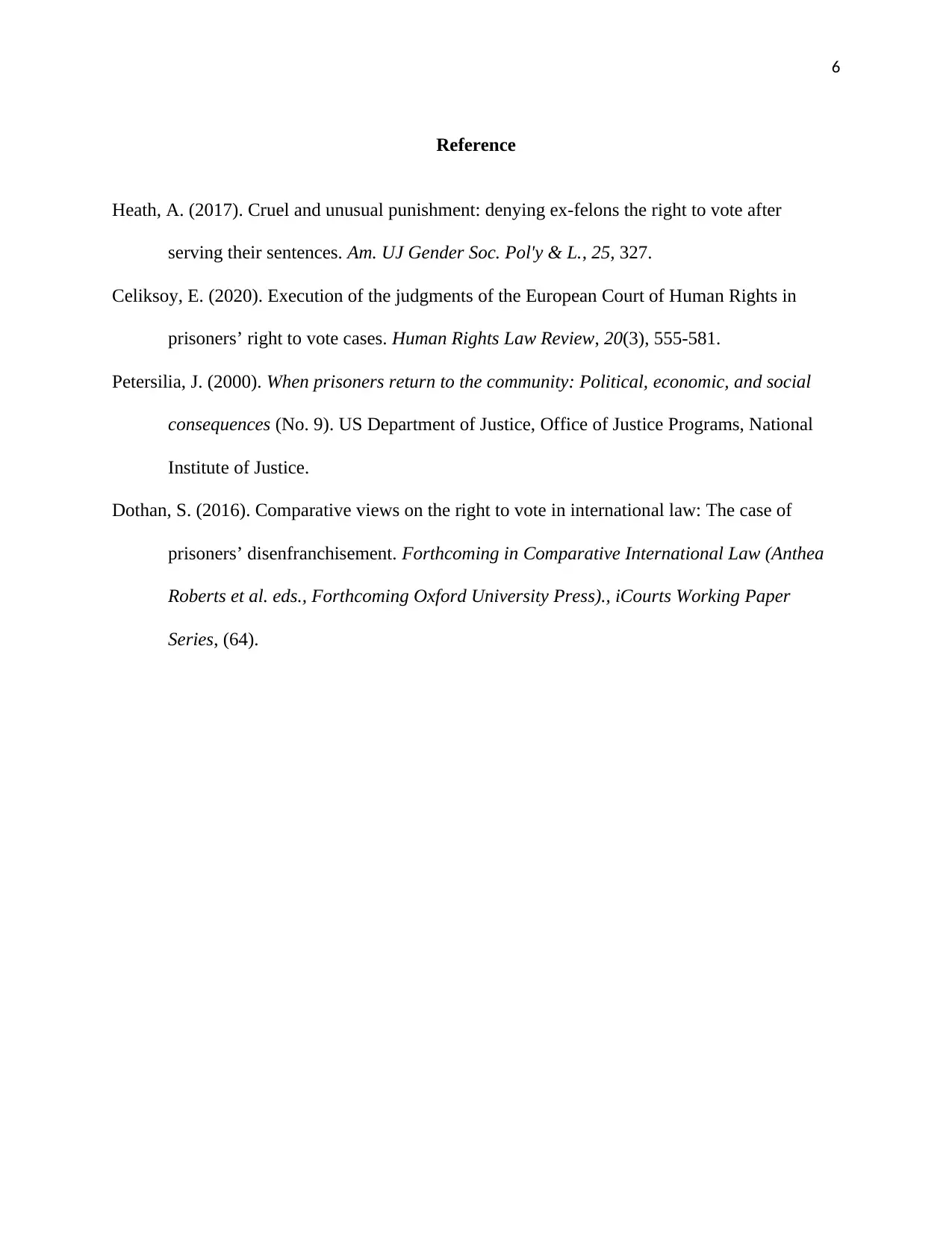
6
Reference
Heath, A. (2017). Cruel and unusual punishment: denying ex-felons the right to vote after
serving their sentences. Am. UJ Gender Soc. Pol'y & L., 25, 327.
Celiksoy, E. (2020). Execution of the judgments of the European Court of Human Rights in
prisoners’ right to vote cases. Human Rights Law Review, 20(3), 555-581.
Petersilia, J. (2000). When prisoners return to the community: Political, economic, and social
consequences (No. 9). US Department of Justice, Office of Justice Programs, National
Institute of Justice.
Dothan, S. (2016). Comparative views on the right to vote in international law: The case of
prisoners’ disenfranchisement. Forthcoming in Comparative International Law (Anthea
Roberts et al. eds., Forthcoming Oxford University Press)., iCourts Working Paper
Series, (64).
Reference
Heath, A. (2017). Cruel and unusual punishment: denying ex-felons the right to vote after
serving their sentences. Am. UJ Gender Soc. Pol'y & L., 25, 327.
Celiksoy, E. (2020). Execution of the judgments of the European Court of Human Rights in
prisoners’ right to vote cases. Human Rights Law Review, 20(3), 555-581.
Petersilia, J. (2000). When prisoners return to the community: Political, economic, and social
consequences (No. 9). US Department of Justice, Office of Justice Programs, National
Institute of Justice.
Dothan, S. (2016). Comparative views on the right to vote in international law: The case of
prisoners’ disenfranchisement. Forthcoming in Comparative International Law (Anthea
Roberts et al. eds., Forthcoming Oxford University Press)., iCourts Working Paper
Series, (64).
1 out of 6
Your All-in-One AI-Powered Toolkit for Academic Success.
+13062052269
info@desklib.com
Available 24*7 on WhatsApp / Email
![[object Object]](/_next/static/media/star-bottom.7253800d.svg)
Unlock your academic potential
© 2024 | Zucol Services PVT LTD | All rights reserved.
